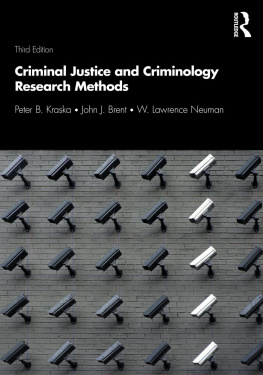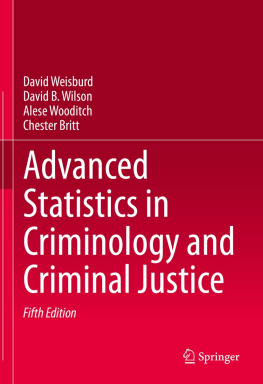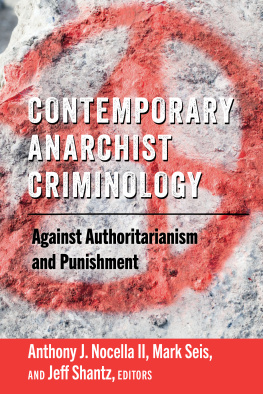Advancing Quantitative Methods in Criminology and Criminal Justice
Advancing Quantitative Methods in Criminology and Criminal Justice is designed to promote the understanding of various quantitative research methods and to encourage their use among those seeking answers to questions about crime and justice. To this end a number of top scholars have been assembled to provide their insights on a variety of cutting edge quantitative research techniques. A wide range of expert contributors delve into the state of quantitative methods in the discipline, group-based trajectory modeling, spatial dependence models, structural equation models, meta-analysis, social network designs, panel data modeling, and censored regression techniques. This book will be highly beneficial for readers who seek to stay as current as possible as they pursue answers to questions about crime and justice using quantitative research methods.
This book was originally published as a special issue of the Journal of Criminal Justice Education.
Travis C. Pratt is a Professor in the School of Criminology and Criminal Justice at Arizona State University, USA. He is the author of more than forty-five refereed articles which have appeared in journals such as Criminology, Justice Quarterly, Crime and Delinquency, the Journal of Research in Crime and Delinquency, Advances in Criminological Theory, and Crime and Justice: An Annual Review. He is also the author of Addicted to Incarceration: Corrections Policy and the Politics of Misinformation in the United States (2009).
First published 2012
by Routledge
2 Park Square, Milton Park, Abingdon, Oxon, OX14 4RN
Simultaneously published in the USA and Canada
by Routledge
711 Third Avenue, New York, NY 10017
Routledge is an imprint of the Taylor & Francis Group, an informa business
2012 Academy of Criminal Justice Sciences
This book is a reproduction of the Journal of Criminal Justice Education, Volume 21, Issue 2. The Publisher requests to those authors who may be citing this book to state, also, the bibliographical details of the special issue on which the book was based.
All rights reserved. No part of this book may be reprinted or reproduced or utilised in any form or by any electronic, mechanical, or other means, now known or hereafter invented, including photocopying and recording, or in any information storage or retrieval system, without permission in writing from the publishers.
Trademark notice: Product or corporate names may be trademarks or registered trademarks, and are used only for identification and explanation without intent to infringe.
British Library Cataloguing in Publication Data
A catalogue record for this book is available from the British Library
ISBN13: 978-0-415-78310-1
Typeset in Helvetica
by Taylor & Francis Books
Disclaimer
The publisher would like to make readers aware that the chapters in this book are referred to as articles as they had been in the special issue. The publisher accepts responsibility for any inconsistencies that may have arisen in the course of preparing this volume for print.
Contents
Travis C. Pratt
Daniel S. Nagin and Alex R. Piquero
Robert J. Fornango
Jacinta M. Gau
Travis C. Pratt
Jean Marie McGloin and David S. Kirk
John L. Worrall
Christopher J. Sullivan and Tara Livelsberger
Robert J. Fornango is an Assistant Professor in the School of Criminology & Criminal Justice at Arizona State University, USA. His research explores the dynamic processes that shape crime trends in the USA at the national, regional, city, and neighborhood levels. Specifically, his interests include studying the influences of structural change, criminal justice policies, and spatial dynamics in explaining social organization and violent crime. Recent co-authored work has appeared in the journals Criminology and Criminology & Public Policy.
Jacinta M. Gau is an Assistant Professor at the University of Central Florida, USA. Her research interests are primarily in the field of policing and include broken windows theory and order maintenance policing, race and policing, procedural justice and police-community relationships, and police use of force. Her work has appeared in journals such as Justice Quarterly, Criminology & Public Policy, Police Quarterly, and Policing: An International Journal of Police Strategies and Management.
David Kirk is an Assistant Professor in the Department of Sociology and a faculty research associate of the Population Research Center at the University of Texas at Austin, USA. His current research explores the influence of social context and neighborhood change on criminal behavior. Dr. Kirk's recent research has appeared in American Sociological Review, Criminology, Demography, and the Journal of Quantitative Criminology.
Tara Livelsberger is a doctoral student in the School of Criminal Justice at the University of Cincinnati, USA. She earned her MA in sociology at Ohio University in 2009. Her research interests include corrections, punishment and society, and research problems in criminology.
Jean Marie McGloin is an Associate Professor at the University of Maryland, USA, in the Department of Criminology and Criminal Justice. Her research interests include groups and crime, as well as specialization. Dr. McGloin's recent publications have appeared in Criminology, the Journal of Quantitative Criminology, and the Journal of Research in Crime & Delinquency.
Daniel S. Nagin is Teresa and H. John Heinz III University Professor of Public Policy and Statistics in the Heinz College, Carnegie Mellon University, USA. He is an elected fellow of the American Society of Criminology and of the American Society for the Advancement of Science, and is the 2006 recipient of the American Society of Criminology's Edwin H Sutherland Award. His research focuses on the evolution of criminal and antisocial behaviors over the life course, the deterrent effect of criminal and non-criminal penalties on illegal behaviors, and the development of statistical methods for analyzing longitudinal data.
Alex R. Piquero is a Professor of Criminology at the University of Texas at Dallas, USA, and co-editor of the Journal of Quantitative Criminology. His research interests include criminal careers, quantitative research methods, and criminological theory. He has received numerous research, teaching, and mentoring awards throughout his career.
Travis C. Pratt is a Professor in the School of Criminology and Criminal Justice at Arizona State University, USA. His research focuses on criminological theory and correctional policy, and he is the author of Addicted to Incarceration: Corrections Policy and the Politics of Misinformation in the United States (2009). His works have also appeared in Crime and Justice: A Review of Research, Criminology, Journal of Research in Crime & Delinquency, and Justice Quarterly.
Christopher J. Sullivan, PhD, is an Assistant Professor of Criminal Justice at the University of Cincinnati, USA. His research interests include developmental criminology; juvenile delinquency and prevention policy; and research and analytic methods. His recent work has appeared in Criminology, Journal of Research in Crime & Delinquency, British Journal of Criminology






